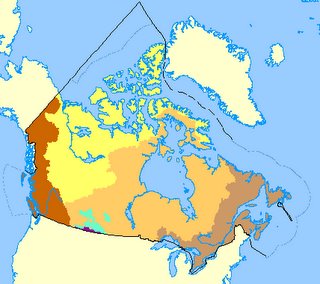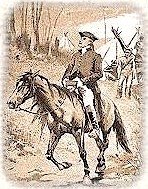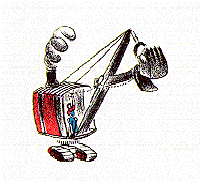
At the beginning of April, I posted
a picture of a piece of artwork done by a well-known children's book author/illustrator, and asked you to guess who the artist was.
Island Sparrow guessed correctly that the artist was Virginia Lee Burton, the creator of those wonderful machinery heroines (and yes, they were girls!) like Mary Anne, the obsolete steam shovel who finds a new line of work in
Mike Mulligan and His Steam Shovel, and Katy the determined little tractor in
Katy and the Big Snow.
Virginia Lee Burton is the name she published her children's books under, but that was really just her maiden name. More officially, and in her works other than the children's books, she was Virginia Lee Demetrios, wife of George Demetrios, and mother of the two little boys for whom she was creating books.
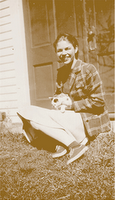
Her life and work has several remarkable similarities to Wanda Gag's life and work (Do you remember, Wanda? She was
our first mystery artist.), starting with the turn her life took because of difficult circumstances in her family. Wanda Gag had to give up some of her dreams to support her family after her father died; and Virginia Lee Burton wanted to be a dancer, and had just signed a contract to be in her sister's dance troupe, when her father broke his leg. She chose to stay home and look after him instead of travelling as a dancer. That, she said, "was the beginning and end of my dancing career, which was just as well, because I wasn't very good anyway."
While at home in Boston, she took a job as a "sketcher" for the
Boston Transcript, making sketches of dancers and actors to accompany articles written by the drama and music critic. It was in Boston that she enrolled in a drawing class taught by George Demetrios, an art teacher who had come highly recommended to her; and after only a few months, she and George Demetrios were married.
Once she had her two sons, Virginia Lee Demetrios became interested in producing books for children. She tested both the stories and the drawings on her own children, and adjusted things (or not) depending on their reactions to them. "Children," she said, "are very frank critics." And excellent ones, too, judging by the quality of the finished work her collaboration with her sons produced.
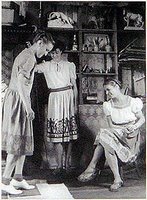
When her sons grew out of the picture book stage, Virginia Lee moved on to another project--teaching design to people in Folly Cove (an area of Gloucester, Massachusetts) where her home was. Her design class evolved into a cooperative group of designers called Folly Cove Designer, whose works consisted of linoleum block prints stamped onto fabric used to make clothing and items for the home. Products from the Folly Cove Designers, headed by Virginia Lee Demetrios, were eventually sold throughout the United States in the 1950s. The piece shown in the mystery artist post linked above is one of the Folly Cove designs done by Virginia Lee, a fabric print called
Fish Story; and the photo to the left is a picture of three of the Folly Cove designers dressed in dresses made from linoleum print bordered Folly Cove fabrics. That's Virginia Lee Demetrios sitting on the right of the photo.
In another parallel to Wanda Gag's life, Virginia Lee Demetrios died of lung cancer when she was in her fifties, too. That was the end of Folly Cove Designers, although various museums still feature works from the design cooperative.
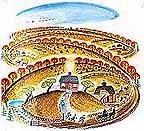
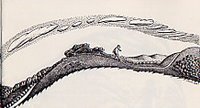
I can't help thinking that there is a similarity in the drawings and prints of the two women as well: the roundness of the hills that featured prominantly in their children's book illustrations, and their trees and cats. On the left, for example, is an illustration from Virginia Lee Burton's
The Little House, which was her Caldecott Medal winner. Compare that, especially the circular hills, with the Wanda Gag's illustration from
Millions of Cats on the right.
And remember Wanda Gag's tree with little cat from the
cover page of Millions of Cats? This is one of Virginia Lee Burton's trees, and below it is a Folly Cove placemat featuring two of her cats.


Yes, the similarities between the two women are striking, but there's at least one noteworthy difference. Wanda Gag, if you remember, fabricated world travelling adventures and prestigious awards in a story of her life that she wrote just before her death. It would seem that she wanted more than her circumstances gave her. Virginia Lee Demetrios, on the other hand, seemed perfectly content to focus her life and her work around her family and community, and saw in her life's circumstances perfect opportunities for expression.
For good measure, here are a few more examples of her work.

This is a design for a tablecloth called
A Rose is a Rose. The tablecloth would have been part of the Folly Cove Designers line of housewares.

This is a full page spread from
Katy and the Big Snow. Katy was modeled after one of the tractors used by the city of Gloucester at the time the book was written.
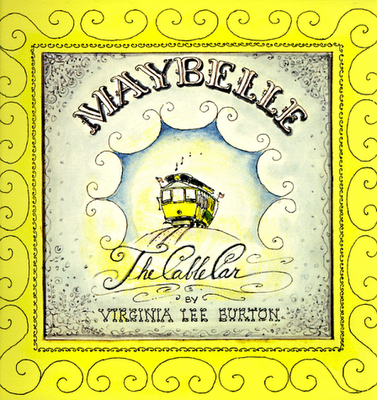
Last, we have the cover of
Maybelle the Cable Car, featuring another of Virginia Lee Burton's machinery heroines.
If you still have young children, I hope you are reading them some of Virginia Lee Burton's picture books, along with other classic picture books, too, like those of Wanda Gag. They may not be as flashy as some of the more recently produced children's books, but they've proven themselves popular through a few generations of children, and are part of our collective children's literature heritage. Besides, they'll like them. I promise.
Tags:
Virginia Lee Burton,
Virginia Lee Demetrios,
children's literature,
children's illustrators,
children's authors,
Folly Cove Designers











